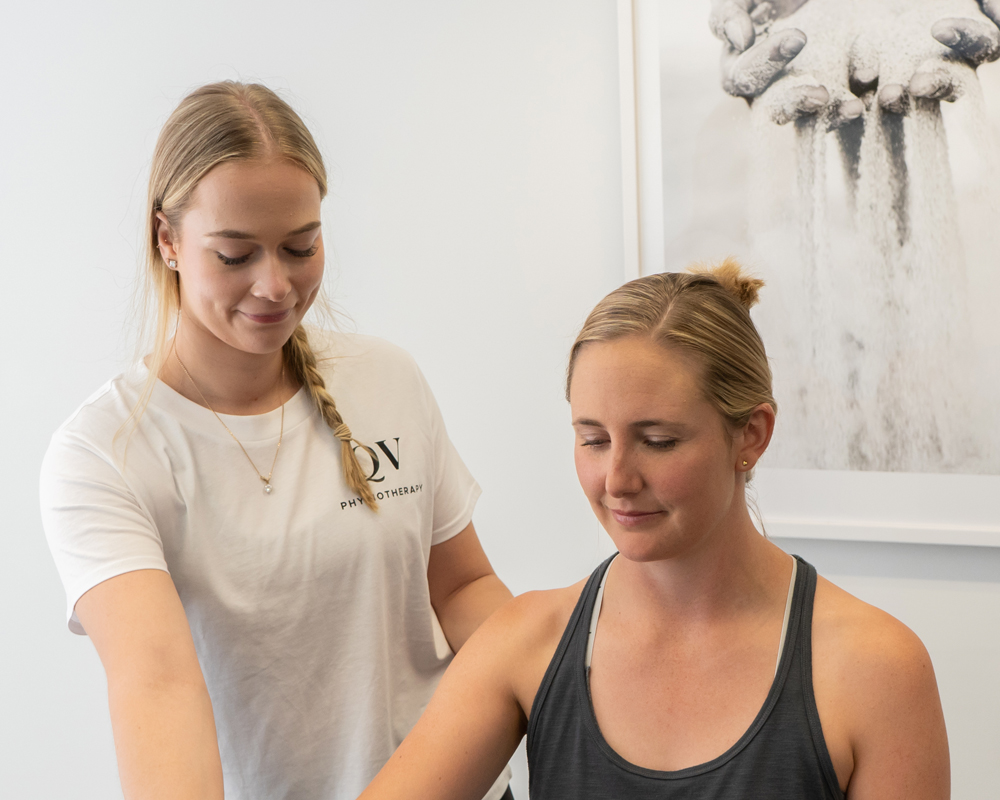Women’s Health Physiotherapy
We pride ourselves on active therapy.
At QV Physiotherapy, we cater to women at every stage of life, from pre or post-natal through to managing the natural and unexpected challenges that occur as we age. Wherever you are, we are here to help you through this time. Our experienced women’s health physiotherapists provide expert treatment and thorough assessment ensuring that you can live the life you want.
Pregnancy Related Conditions
Did you know that regular pelvic floor training whilst pregnant can significantly reduce the risk of incontinence postnatally? Interestingly, studies have also shown that approximately 30% of women perform a pelvic floor activation incorrectly when prompted.
Laura can help you identify if you are doing your pelvic floor exercises correctly and prescribe a home exercise program to keep your pelvic floor as strong as possible throughout your pregnancy.

Frequently Asked Questions
A Pelvic Floor Physiotherapist is a qualified physiotherapist registered with AHPRA (The Australian Health Practitioner Regulation Agency) who has undertaken additional training to be able to treat conditions of the pelvic floor.
You do not require a referral to see a pelvic floor physiotherapist however letters or reports from your treating doctor or health professional are always helpful.
Our standard initial Pelvic Floor or prenatal appointments are 45 minutes in duration.
Post Natal Checks are 1 hour. If you would prefer an extended session for a complex condition or are seeking treatment for multiple issues then please ask for a 1 hour appointment when speaking to our friendly reception staff.
It is not necessary to have an internal assessment if you do not feel comfortable.
Examination of the pelvic floor may be recommended as part of the physical assessment if it is relevant to your subjective assessment. Your physiotherapist should always inform you of alternatives to the internal examination and your participation in any aspect of the assessment is always your choice. Please let your Physiotherapist know your preferences at any time.
Yes. It is your personal choice whether to have the assessment completed during your period. Your physiotherapist will always wear gloves & protective equipment. It will not affect your assessment.
EPC care plans are welcome & encouraged for chronic conditions (>3 months duration of symptoms). You can claim your rebate back directly with us on the spot.
All Pelvic Health Physiotherapy services are rebatable with PHI extras. The rebate amount depends on your level of cover and you will have to check this with your individual provider.
Women’s Health Initial (45mins): $140
Post Natal Check (1hr): $150
Women’s Health Follow Up (30mins) $100
Follow Up Long Session (45 mins): $125
Subjective History:
Your physiotherapist will take a comprehensive history, including questions regarding your bladder, bowel, gynae, sexual, obstetric, past history and general health. They will also ask your reasons for attending pelvic health physiotherapy so that they can ensure your treatment program is specific to your goals.
Assessment:
Your physiotherapist will assess several areas of your body, with particular focus on your pelvis, abdominals and spine. All of these elements can contribute to pelvic floor issues and are therefore important to assess. Assessment may take part over 1-2 sessions, depending on the complexity of your issues.
Externally, the range of movement of your spine and hips will be assessed, along with palpation of the muscles around your back, abdominals, gluteals and inner thighs. Your physiotherapist will also assess your breathing patterns, as your diaphragm is closely linked to your pelvic floor.
Pelvic Floor Assessment is often a key part of the examination. There are multiple ways to assess the pelvic floor, including the following:
The gold standard method of pelvic floor assessment is internal via a vaginal or rectal exam. This is a sensitive examination where a lubricated, gloved finger will be inserted inside the vagina or rectum to assess the pelvic tissue & pelvic floor muscles. Via this examination, your physiotherapist can assess the strength and endurance of your pelvic floor muscles and also determine whether there is pelvic floor overactivity, muscle spasm, tissue dryness or prolapse. No equipment is needed and the examination should be pain free.
If you are not comfortable with an internal exam, then a Real Time Ultrasound machine may be used. This involves applying a probe externally to the skin just above the pubic bone. An image of the bladder & pelvic floor muscles is created on a screen and we can then assess the activation and endurance of your pelvic floor muscles in real time. This tool is useful for assessing technique and is a good place to start to get an idea of how the pelvic floor muscles are working.
Creating a Management Plan:
Your physiotherapist will explain the findings of your assessment and create a management plan with you that is specific to your goals and considers your personal choices
If you are experiencing bladder issues, then 3 months of supervised pelvic floor strengthening is indicated as first line treatment.
For chronic pelvic pain syndromes, there will likely be discussions around pain science, promoting healthy lifestyle habits and downtraining pelvic floor sensitivity.
Management plans will be unique to every client but there is likely to be a combination of manual therapy to relieve sensitive muscles, creation of an exercise rehabilitation program and education for implementing strategies into daily routines.
Meet your Women’s Health Physios

Lauren Kendall
Lauren holds a Bachelor of Applied Science and Masters of Physiotherapy Practice at La Trobe University and has undertaken further training in Clinical Pilates [...]

